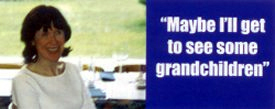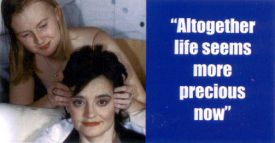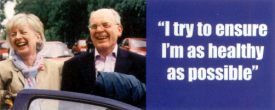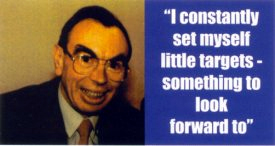Originally published in May 2003 icon
Read their stories: Jane Howell Ruth Hale Gordon Crosskey Mike Renshaw
The Five-Year Watershed
Hope is a great get-well message for anyone coming to grips with cancer. Dazed by shock and the prospect of tough treatment, you may wonder how you will get through the next day, never mind the next few weeks or months.
As a powerful reminder that there is life beyond cancer - and for some a better life than before, icon meets four people who have been through the malignant mill and passed safely through the five-year watershed they too once thought an eternity away. Five years is the "magic number" often quoted as representing, if not a cure, then at least a strong probability that cancer will not recur.
"There are no guarantees or certainties" says Stephen Duffy. Professor of Cancer Screening at Cancer Research UK. "but subjective clinical impression, backed by survival curves for almost all cancers suggests that a patient doing pretty well for the first few years tends to do pretty well in the long run.
There are probably several hundred types of cancer and five years is a reasonably good marker for most of them. If you’ve survived five years, you are probably unlikely to get it again." And perhaps the best news of all is that as time goes by, cancer loses its hold on your life. It may always be part of the story, but the overall script is yours again to write.

Jane Howell
Jane Howell sees the years since her mastectomy as nothing less than a transforming journey." I’m not the same person I was before. I now look after myself better than I did. I’ve taken a degree in counselling, I’ve discovered the joy of skiing (previously I was too scared to learn); I speak my mind instead of storing up hurt, and above all my marriage is a lot stronger than it was before cancer. Yet on diagnosis with a very aggressive type three breast cancer, Jane, a former nurse, despaired: ’I was just 40 and my youngest child was only six My treatment was delayed because the lump I first discovered a year earlier, seemed to disappear for a while. So statistically the prognosis was not great. I remember being so frightened and overcome with urgency to be rid of the tumour that I persuaded my surgeon to forgo his golf to operate on me the very next day.
In hospital, after surgery, I couldn’t stop crying, irrationally convinced that I would never get out of the place alive. I remember the Sister reproving me and telling mel really had to stop the tears because a friend had arrived to visit. My friend just said that it was fine with her if I wanted to cry - she would just sit and cry with me. Moments later we were doubled up laughing because we’d seen the dragon off! And perhaps that was the first step to recognising that my world hadn’t ended. The next was going out into the hospital gardens on day seven, kicking off my shoes feeling the grass still there beneath my bare feet. ’Yes’ I thought ’I’m feeling a little bit stronger, and things do get better.’"

It meant a lot that I was able to go out feeling confident and keeping plans made before I was diagnosed

Jane maintains that "You can only cope in the way you can at any one time, and that’s fine." Two weeks after surgery her breast care nurse called to help her dress before a charity ball for which (not yet knowing about the cancer) she’d bought a new, slightly low-cut frock. "It meant a lot that I was able to go out feeling confident and keeping plans made before I was diagnosed." Jane found it a boost to look at Bacup’s brochure "of cheerful looking women with breast cancer who’d moved on in their lives" whenever she was feeling down "and always to have small targets and treats in view, especially during my chemo and radiotherapy. I’m not particularly churchgoing but three weeks after getting home I went to see my priest, with the thought, I suppose, at the back of my mind that he might one day need to know me a bit. He gave me the sacrament of the sick and some hours later I found myself filled with an incredible peace and a sense that things were going to be fine. I had to remain optimistic for the children - the older two were only 12 and 14. I used to say to myself: ’No, this is too soon. They still need me.’"
After 16 months Jane opted for reconstructive surgery - ’a huge turning point because it really made me feel completely normal again. With one breast I had a daily reminder of what I’d been through. Now I could get dressed again without a thought - or changed in the communal gym changing room without a qualm. I could - and do -wear little strappy dresses and bikinis. Also your weight distribution is restored on your front so you’re much less likely to get niggles in your back because of imbalance." Two years on, Jane met a consultant (not her own) at a party. "He said I’d done so well that my chances were now very good. This really gave me hope. The five-year watershed! didn’t really celebrate, because I knew that with breast cancer there are no absolute guarantees. I did, however expect my consultant to discharge me from further check-ups. But this surprised him: ’My ladies like to come back and see me every year’ he said. I told him that I didn’t want to goon feeling like a patient, which be accepted." Jane remains, however, extremely vigilant ’It’s natural to worry if I suddenly get a backache or I notice my eyes have deteriorated. I’m learning not to panic and so overlook the simple explanation - that I’ve picked up the shopping awkwardly, or I’m just the age when I need glasses."
For Jane the real watershed celebration came after with the silver wedding anniversary, "we once thought we might never see. My poor husband had an awful lot to put up with because people always asked how I was, but never thought how my illness might be affecting him. Now he spoils me and says he’s so lucky that ’rn still here with him." Quite early on Jane was irritated by the person who told her that there would be a positive side to my cancer - "But gosh, they were right. I used to worry about what was not quite as it should be in my life, but now whatever there is - a sunny day, spring flowers, laughter with friends, closeness with family I make the most of it. For the past few years I’ve not thought beyond the day, but now I’m just starting to make plans again, and to think that maybe I’ll get to see some grandchildren."

Ruth Hale
"There’s life after cancer" says Ruth Hale, 23 (above with Cherie Blair). "But it’s a life you may have had to put down for a while, to pick up with a different thread." Wise words from the young woman whose teenage years was drastically disrupted when at 15 she was diagnosed with a brain tumour - a large pineal blastoma, more commonly found in toddlers. Looking back, Ruth says that it was almost a relief to discover what was wrong - albeit so serious. "Finally knowing my situation after feeling ill for a long time, I felt I could now concentrate on getting better."
For three months before she even had a scan, Ruth’s school suspected she might be trying to wriggle out of impending GCSEs and even the doctor thought her constant headaches and double vision could have a psychological cause. Ruth found her surgeon at Hurstwood Park Princess Royal Hospital, Sussex very friendly and ready to explain every detail of what he was going to do. "I love my long blonde hair, so luckily he stressed he wouldn’t have to take too much - about the size of a small notepad up the back. Two days after a short operation to insert a drain that would reduce the fluid pressure from her brain, Ruth had a further nine hours of surgery in which 90 per cent of the tumour was removed. "My parents were very worried during the critical post-op period, but I had a wonderful night nurse in intensive care who surrounded me with cooling fans and left the radio on, despite complaints from another patient! I lost loads of weight - about two stone - after the surgery and fainted when I had my first bath shortly before leaving hospital."
During three months of chemo at the Royal Marsden, Ruth was back on the ward several times with infections and low blood count. "I don’t know where I got the resources to handle all this, but I do remember feeling quite glad that it was me who was ill because I didn’t think anyone else in our family could have handled it. Friends always thought me the quiet one, but actually I’m fairly brave and if anything needed doing I was the one to get out there and ask."

I don’t know where I got the resources to handle all this

By the time scans revealed that the tumour was receding, Ruth was ready for a little spoiling which came in the form of a week at Center Parcs courtesy of Sargent Cancer Care for Children who also helped her parents (unable to work during this time) with travel costs from their Brighton home to the Marsden. A sick teenager touches many hearts and Ruth was also given the fairy godmother treatment by the Make A Wish Foundation: "I didn’t want to meet anyone famous or go to Sydney, so I asked for a year’s swimming pass to my local pool. Apparently there was a separate grant for this, so in the end I asked for a computer which arrived between my chemo and radiotherapy, and which I still use now."
Seven weeks of deeply unpleasant radiotherapy paid off: "by the end of radiotherapy doctors had the result they hoped for and that I had never doubted for a moment - the tumour was entirely gone." Ruth, her parents and two dogs went to Ireland for another, badly-needed break, soon followed by a fantastic holiday in the Turks and Caicos Islands "one of the first such holidays for sick teenagers donated by a new charity Free Spirit."
During her illness Ruth was on several prayer and healing lists, Her parents make and sell candles, and one of their shopkeeper customers gave Ruth’s father a piece of healing rose quartz for her. "the odd thing is that it was snowing that day. My dad put the crystal in his jeans pocket yet when it got to me the quartz was still really hot as if full of healing energy. I just hung onto it, and have kept it ever since."
Ruth still suffers with low energy and fatigue, and is very sensitive to stress. "But I see an awful lot of good coming from what I have been through. It gave me a second chance at life when I wasn’t doing very well at school. I’ve trained in Swedish massage, then in aromatherapy and finally in reflexology. I’ve worked at a local charity called Threshold for lonely, depressed and abused women. I also learned Reiki, primarily to help me sleep and relieve headaches, but I use it now to work, unpaid, with a healing support group for anyone touched by cancer, affiliated to a charity called New Approaches. Every now and again I think of doing an access course or training to be a physio. but that could take five years - and by then I’d like to have children with my boyfriend Carl, an electrical engineer I’ve learned to drive, I go to a gym, I cycle, go dancing and I have a wonderful boyfriend. I’m vegetarian, bordering on vegan - I eat fish but no dairy. I may only be 23 but I already know that I’ve been very very lucky. Two years ago I helped open the Malcolm Sargent house in Bexley which helps young people with cancer pick up lost qualifications and become more independent. Cherie Blair came to the launch and I gave her a head massage! Altogether life seems more precious now and it’s more important to make sure that I’m happy, and appreciate the good things of every day."

Gordon Crosskey
Nine years after his brush with prostate cancer, guitarist Gordon Crosskey continues to lecture at the Royal Northern College of Music and to "stack all the chances" in favour of living life long and to the full. Gordon - who recently made a happy second marriage - feels that prostate cancer is "no big issue". You’ve got to be pretty unlucky or caught very Late not to survive the magic five years. Talking about a ’cure’ can be meaningless, but with a little luck, a lot of men live to a normal old age and die of something else long before prostate cancer gets them." Two months after diagnosis Gordon had a radical prostatectomy in Sheffield with no further treatment. Local lymph nodes were unaffected. But five and a half years on, his PSA started to creep up again.
Seeking a second, private opinion at the Royal Marsden he saw a well-known oncologist, Dr Durnley "who advised having radiotherapy because although the MRI and bone scans were negative, it looked as if some cells had escaped surgery. He put me on Casodex a hormone monotherapy that is slightly different from the normal combined hormone treatment that stops you producing testosterone. Casodex doesn’t prevent production, but acts on the surface of cancer cells and prevents them from taking up testosterone. It doesn’t affect your libido as much. The idea was that we would wait for a few months until the number of cancer cells dropped and follow up with radiotherapy when there was less to attack. I had treatment every weekday for four weeks. With no clear guidelines from the medical profession as to precisely what the most effective treatment would be, I am happy with my decision to get rid of the bulk of the problem with surgery and cope with what arose afterwards.
Two years on, my PSA has dropped to a very low 0.10, but to me even that doesn’t mean I’m entirely out of the woods. I never felt II in the first place. PSAs are only a rough guide as I’ve heard that it’s possible to have an enormous PSA but virtually no symptoms, or a single figure PSA that suddenly shoots up. I have changed my diet and dropped 10 lbs in weight to ensure that I’m as healthy as possible. I eat no red meat or dairy and have at least three vegetarian meals a week. I drink soya milk, green tea and take a lot of lycopene in cooked tomatoes. I take selenium, fish oil capsules and vitamin F in dry form, because a particular American urologist who is a prostate sufferer himself thinks it is better than the liquid form. I heard a seminar in which urologist Br Charles Meyer stressed the benefits of meditation and relaxation. I haven’t tried these, I admit, but when I’m playing I’m in a world of my own anyway."

Mike Renshaw
Mike Renshaw’s children are throwing a party for his 60th birthday this August. "I don’t want loads of presents," he says, "so I’m asking for donations to Kidney Cancer UK instead." More than the big 60 milestone, Mike’s celebration also marks seven years since he himself underwent a radical nephrectomy. His illness hasn’t run the straightforward course that was at first foreseen, but presently "in pretty good health, cheerful and positive" Mike jokes that he and his second wife Jennifer "celebrate anything we can". Formerly a businessman with his own printing and video production company, Mike is now the busy Secretary of Kidney Cancer UK, producing its annual report, regular newsletters and fielding phones and correspondence: "It all keeps me out of mischief" he quips, "and I’m glad to send out fact packs so others aren’t as uninformed about the disease as I was when it struck." Although shocked to receive a rather abrupt diagnosis, Mike points out that kidney cancer "is not quite as rare as we are led to believe. There are about 15,000 UK sufferers, and it’s the eighth most common cancer in men." In women it’s now the fastest-growing form of the disease.
And the tricky factor is that kidney cancer is unpredictable - it affects people in different ways and their response to treatment is equally variable.

Whipping it out I was told, would be the end of the affair

After nine months of unidentified pain, building to an emergency crescendo Mike had his affected left kidney embolised and then removed. ’Whipping it out I was told, would be the end of the affair". But it wasn’t. 14 months later Mike learned that the cancer had spread to an adrenal gland, that he had a small lesion on one lung and enlarged lymph nodes in the chest and abdomen. "The consultant virtually said there was nothing he could do to help me now. Jennifer was so shocked she had to be sedated." Rut a referral to the Churchill Hospital, Oxford turned Mike’s prognosis round. "It was a bit frightening to read the doctor’s letter upside down on the desk and see myself described as having ’severe spread’. Rut my new consultant, Professor Adrian Harris put me straight on to a clinical drug trial. When the first drug Razoxane proved ineffective, he suggested Marimastat - which worked."
Two months later the lesion on Mike’s lung had disappeared; the 1.3cm adrenal tumour was 70 per cent reduced and there has since been no indication of disease progression or spread.
All this would be cause for jubilation, except that the company producing Marimastat has now stopped making it because trials have not proved its success. So the irony is that Mike, for whom it has proved invaluable, will have to try an alternative drug when stocks run out. How does he manage to view this prospect so phlegmatically? "I take a fairly resigned view of things," says Mike. "I just hope that indeed another drug will be found. And through my working contact with other patients I have no doubt that I can only benefit by staying positive. I constantly set myself little targets that are just far enough away to have something to look forward to. It could be learning something new on my Yamaha keyboard or taking the small granddaughters to the theatre. As well as my 60th, Jennifer and I are off to Portugal in July and in August my sister has organised a coast-to-coast walk in aid of Kidney Cancer UK. I’m going to be the back-up driver. The fundraising is important because only two per cent of all cancer research funding goes on kidneys, yet this cancer affects three per cent of patients. If we can increase funding by only 50 per cent then that in itself will make a vast difference."